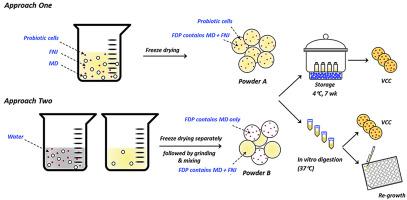Food Bioscience ( IF 4.8 ) Pub Date : 2020-08-23 , DOI: 10.1016/j.fbio.2020.100740 Chuang Zhang , Siew Young Quek , Nan Fu , Yuwen Su , Paul A. Kilmartin , Xiao Dong Chen

|
Microencapsulation of fermented noni juice (FNJ) with probiotics is a challenge due to the presence of antibacterial compounds, high levels of organic acids as well as the low pH of the juice. This study aimed to fortify FNJ with Lactobacillus plantarum P8 (LP) and Lactobacillus rhamnosus GG (LGG) using freeze drying, by exploring the possibility of retaining high cell survival rates in the dried powders after drying, during storage and with simulated gastrointestinal (SGI) digestion conditions. Two approaches were studied: 1) drying of the FNJ with bacterial cells simultaneously (powder A); and 2) drying of the FNJ and bacterial cells separately followed by grinding and mixing of the powders (powder B). Both approaches gave powders with high viability (≥9 log CFU/g) of microencapsulated LP and LGG. However, comparing both powder samples, the survival rates of LP and LGG in powder B was significantly higher. After a 7 wk storage at 4 °C, both bacterial strains in powder A showed significant reductions in their viabilities compared to in powder B. The SGI results showed significant lower viable cell counts for both bacteria strains in powder A. After SGI, the viability of bacterial cells in powder B was >7 log CFU/g, higher than the recommended minimal viable probiotics cell concentration according to the US FDA. Between the two strains, LP had a higher survival rate in pure FNJ and a better tolerance toward bile salts (1.2%, w/v). This research showed that fortification of FNJ with a suitable Lactobacillus could be achieved using freeze drying microencapsulation.
中文翻译:

包含发酵诺丽汁和益生菌的微胶囊粉末的储藏稳定性和体外消化
由于存在抗菌化合物,高水平的有机酸以及果汁的低pH值,用益生菌将发酵诺丽果汁(FNJ)微囊化是一个挑战。这项研究旨在用植物乳杆菌P8(LP)和鼠李糖乳杆菌加强FNJGG(LGG)使用冷冻干燥,通过探索在干燥后,储存期间和模拟胃肠(SGI)消化条件下在干燥粉末中保留高细胞存活率的可能性。研究了两种方法:1)同时用细菌细胞干燥FNJ(粉A);2)分别干燥FNJ和细菌细胞,然后将粉末研磨和混合(粉末B)。两种方法都可以使微囊化的LP和LGG具有高活力(≥9log CFU / g)。但是,比较两种粉末样品,粉末B中LP和LGG的存活率明显更高。在4°C下储存7周后,与粉末B相比,粉末A中的两种细菌菌株均显示出活力显着降低。SGI结果显示,粉末A中两种细菌菌株的活细胞计数均显着降低。SGI之后,粉末B中细菌细胞的生存力> 7 log CFU / g,高于美国FDA推荐的最低可行益生菌细胞浓度。 。在这两种菌株之间,LP在纯FNJ中具有更高的存活率,并且对胆汁盐的耐受性更好(1.2%,w / v)。这项研究表明,FNJ的防御工事乳酸菌可以使用冷冻干燥微囊化来实现。











































 京公网安备 11010802027423号
京公网安备 11010802027423号